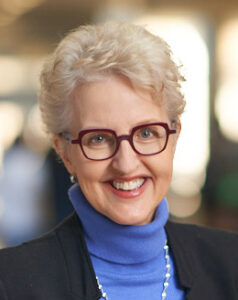Compiled and Edited by Miriam Bernard
Dr. Linda J. Richards, AO, PhD is a professor, lab head and department head at Washington University in St. Louis Medical School, Department of Neuroscience. She is a Patron and Scientific Advisor to the Australian Disorders of the Corpus Callosum (AusDoCC) and a scientific collaborator with the NODCC. Dr. Richards and her team are trying to answer the questions, “How does the corpus callosum form during development?” as well as “What factors regulate the axonal plasticity that is found in people with DCCs?” They’re also asking, “How does this axonal plasticity affect neurocognitive outcomes for people with DCC?”
This research will impact DCC persons and their families by providing a comprehensive understanding of the causes and outcomes of DCC. Dr. Richards and her team are attempting to provide answers as to how specific DCCs occur, and in the future, link the causal mechanisms with neurocognitive, motor and sensory outcomes of people with DCCs. Dr. Richards is therefore very interested in the lived experience of people with DCCs so they can link this with their cerebral connectivity. She wants to understand the function of the corpus callosum and how people with DCC can compensate to perform these functions without one.
Dr. Richards and her team work with both children and adults with DCC as well as animal models of DCC. Currently they are studying adolescents and adults with complete or partial DCC who have normal IQ. Participants in the study undergo an MRI and play cognitive games on a computer, both inside and outside the scanner. They will also receive neuropsychological assessment across a range of cognitive domains. Participants are provided with a summary of their neuropsychological testing and a copy of their MRI, as well as payment for their time in being involved in our study.
The research Dr. Richards is currently conducting involves a database where she and her team can enroll anyone of any age with a DCC and their family members that might like to be involved in research. They then assess people within the database and point them to studies that might be suitable in other labs or within the IRC5 (International research Consortium for the Corpus Callosum and Cerebral Connectivity). They also collaborate with Dr Sherr’s group to perform genetic testing on all participants. Their team provide results of genetic testing to the participants through their physician. This research is important and impactful because at present, little is known about how DCC affects people across the lifespan. Their goal for the future is to provide reasonable prognostic information from the moment a DCC is diagnosed so that the most effective treatments can be provided. Therapeutic interventions can come about by understanding the causes, so their goal is to provide the causal mechanisms as the basis for developing new therapies.
Individuals interested in finding out more about the study or participating can email Dr. Richard’s study at corpuscallosumresearch@wustl.

